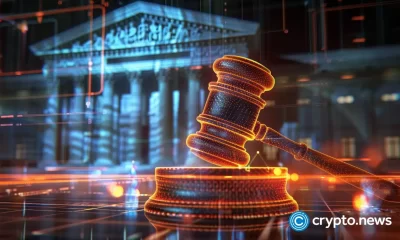AI
Decentralized AI Project Morpheus Goes Live on Mainnet
Published
4 hours agoon
By
admin

Morpheus went live on a public testnet, or simulated experimental environment, in July. The project promises personal AIs, also known as “smart agents,” that can empower individuals much like personal computers and search engines did in decades past. Among other tasks, agents can “execute smart contracts, connecting to users’ Web3 wallets, DApps, and smart contracts,” the team said.
Source link
You may like


California Court Rules Lido DAO Members Can Be Held Liable Under Partnership Laws


BIT Mining settles with SEC for $4m amid bribery allegations in Japan


Metaplanet Buys More Bitcoin As MicroStrategy Acquired 51,780 BTC


Crypto product record major inflow up to $2.2 billion


Cardano Founder Charles Hoskinson Discusses Midnight and XRP With Ripple CTO


Why $100,000 Bitcoin Is Right Around The Corner
Adoption
AI startup Genius Group picks Bitcoin as main treasury asset
Published
7 days agoon
November 12, 2024By
admin

Bitcoin as an institutional reserve asset gained more traction as a Singapore-based AI company took a page from MicroStrategy’s book.
Per a press statement, publicly-traded artificial intelligence firm Genius Group will onboard Bitcoin (BTC) as its main treasury holding and immediately purchase $120 million worth of the world’s leading cryptocurrency.
Genius Group also said it would hold 90% of its current and future treasury value in Bitcoin, adding to its initial 1,380 token buy plan disclosed on Nov. 12. The startup’s GNS shares surged 50% during pre-market trading, according to Yahoo Finance. GNS prices shook off gains by publishing time, but the shares still traded higher than their previous close.
At least three institutional players have now adopted the BTC accumulation strategy pioneered by Michael Saylor’s software behemoth MicroStrategy. Firms like Tokyo’s Metaplanet, medical tech provider Semler Scientific, and now Genius announced BTC purchasing plans inspired by Saylor’s company.
All three companies hold over 1,000 BTC. The trio were leagues away from MicroStrategy’s 279,420 Bitcoin trove valued at over $24 billion due to recent highs.
We believe that with our Bitcoin-first strategy, we will be among the first NYSE American listed companies to fully embrace Microstrategy’s Bitcoin strategy for the benefit of our shareholders.
Thomas Power, Genius Group director
Stocking most of its treasury with BTC was also revealed shortly after Genius reshuffled its top decision-makers. Genius added multiple crypto-savvy board members as the firm paid more attention to web3 and blockchain technology.
Source link
24/7 Cryptocurrency News
Coinbase Unveils On-Chain AI Agents On Ethereum L2 Base
Published
3 weeks agoon
October 27, 2024By
admin
Coinbase announced a new set of fully on-chain AI agents users can create in under three minutes on its Ethereum L2 network Base.
Built with tools from Coinbase, OpenAI, and Replit, these agents can manage crypto wallets, connect with X (formerly Twitter), and perform other tasks.
This marks a significant step toward the convergence of AI and blockchain technology.
Coinbase’s Vision: A Future Where AI Agents Drive DeFi
Recently, Coinbase and its CEO Brian Armstrong showed a far-reaching vision for the new era of AI and blockchain integration. In this world, AI agents have the financial independence to spend and transact through cryptocurrency wallets.
For Armstrong, this is how DeFi becomes a game-changing place. Digital economies are reshaped through AI-driven systems autonomously without human interference.
Create an AI agent with a crypto wallet (and optional X account) in less than 3 minutes
Based Agent! https://t.co/QznYkoZTC0
— Brian Armstrong (@brian_armstrong) October 26, 2024
One major limitation that really holds back AI systems from widely usage today, is financial autonomy. Opening bank accounts or keeping credit cards for AI agents is not possible. They are not able to handle resources or purchase things on their own.
That really hinders their use of important services, like cloud computing in AWS, paid APIs, and subscription-based digital tools. The lack of independent transaction capabilities greatly restricts AI system’s real-world applications.
Cryptocurrency wallets for AI agents remove various barriers that would otherwise be in place. The crypto wallet allows AI agents to interact with open marketplaces, transacting with stablecoins on Base and Coinbase’s Layer 2 blockchain.
Financial independence means that they can pay bills, subscribe to things, or buy digital assets. This capability is a breakthrough that will grant AIs the ability to act as autonomous economic entities across industries.
Because of that, Armstrong recently offered the AI agent a new crypto wallet. He acknowledged that Truth Terminal already had a crypto wallet but insinuated that its human creator controls it.
AI Agents to Drive Crypto Innovation
The integration of crypto wallets with AI agents represents one of those points of inflection in integrating AI with blockchain. This is where the dream of an AI-to-AI economy is being trailed by platforms such as Coinbase. There, even financial transactions and asset management-participation in decentralized governance, is done autonomously between AI agents, independently of human intervention.
For crypto investors, this shift in dynamics translates into an opening of new opportunities. As financial freedom is slowly bestowed upon AI agents, their ability to operate freely, independently in decentralized ecosystems unravels new ways of growth, innovation, and investment. It also promises long-term value for infrastructural and consumer use cases.
Teuta
Teuta is a seasoned writer and editor with over 15 years of experience in macroeconomics, technology, and the cryptocurrency and blockchain industries. Starting her career in 2005 as a lifestyle writer for Cosmopolitan in Croatia, she expanded into covering business and economy for several esteemed publications like Forbes and Bloomberg. Influenced by figures like Don Tapscott and Bruce Dickinson, Teuta embraced the blockchain revolution, believing crypto to be one of humanity’s most crucial inventions. Her fintech involvement began in 2014, focusing on crypto, blockchain, NFTs, and Web3. Known for her excellent teamwork and communication skills, Teuta holds a double MA in Political Science and Law, enjoys punk rock, chablis, and has a passion for shoes.
Disclaimer: The presented content may include the personal opinion of the author and is subject to market condition. Do your market research before investing in cryptocurrencies. The author or the publication does not hold any responsibility for your personal financial loss.
Source link
AI
The AI compute craze for retail investors in web3
Published
1 month agoon
October 12, 2024By
admin

Disclosure: The views and opinions expressed here belong solely to the author and do not represent the views and opinions of crypto.news’ editorial.
As we approach the end of 2024 and reflect on the technological advancements it brought, the buzz surrounding artificial intelligence and high-performance computing continues to overshadow all other web3 developments. As such, this year saw an overwhelming customer demand for AI products and even greater pressure on data centers to deliver AI infrastructure to boost efficiency.
With companies racing to adopt these technologies, many have considered investing in compute resources like graphic processing unit chips, commonly used for training AI models, blockchains, autonomous vehicles, and other emerging applications. But before organizations fully embrace the exciting potential of this hardware, we need to carefully consider the complexities and challenges that come with them.
It’s true that the promise of AI is indeed enticing. Just look at the stats from OpenAI’s ChatGPT, which garners over 200 million active weekly users. From automating mundane tasks to driving sophisticated analytics, the potential of AI and large language models is vast, and these technologies are here to stay.
The growth has just started
Unsurprisingly, organizations are eager to gain a competitive edge through AI, leading major players like Meta and Apple to invest in the software that supports this technology.
A recent report from Bain & Company—a management consulting company—revealed that AI workloads are expected to grow 25 to 35 percent annually over the next several years, pushing the AI-related hardware and software market to between $780 billion and $990 billion by 2027.
However, investing in compute resources involves more than just purchasing hardware or subscribing to a cloud service. If we’re assessing some of the barriers to investing in this software, one of the biggest hurdles investors face is the initial cost.
The costs of advanced GPUs like NVIDIA’s A100 or H100 can be upwards of millions of dollars, with additional costs for servers, cooling systems, or the electricity needed to power the devices. This presents a challenge for retail investors looking to add this technology to their portfolios, often limiting investment opportunities to powerful corporations.
Beyond the hefty price tag, the hardware itself isn’t for the faint of heart. It requires a thorough understanding of optimizing and managing these resources effectively. Investors should have specialized knowledge in the hardware and software, making technical expertise a prerequisite.
Even if affordability and technical challenges weren’t barriers to investing, a significant obstacle remains: Supply or lack thereof. The Bain & Company report reveals that demand for AI components could grow by 30 percent or more, outpacing supply capabilities.
While investing in compute may seem out of reach, there are new models making it more accessible to everyday investors, allowing them to tap into the potential of advanced computing despite existing barriers.
Tokenization as a solution
Through the tokenization of high-compute GPU resources, Exabits offers users an opportunity to become stakeholders in the AI compute economy, allowing them to earn rewards and revenue without needing to manage the complexities of hardware ownership. With affordable entry points and reward systems, Exabits allows individuals to participate in the demand for GPU resources while avoiding the risks associated with direct investment, making investing in AI compute more accessible.
Exabits has coined its business model, “The Four Seasons of GPU,” emphasizing quality assurance and consistency across its GPU offerings. Just as the Four Seasons is world renowned for its high service standards, “The Four Seasons of GPU” provides quality-guaranteed hardware that investors can trust. Investors can rely on Exabits for personalized assistance, similar to the hotel’s commitment to customer satisfaction. As a platform and a business, Exabits aims to provide equal opportunities for investors to participate in this growing AI compute economy.
As demand for computation rises, so does the appetite for investment opportunities within this rapidly emerging space. With the ongoing growth of AI, blockchain, and other tech trends, the future of GPU development will depend on the industry’s ability to meet these demands and create opportunities that continue to broaden access to this esteemed technology.
Source link

California Court Rules Lido DAO Members Can Be Held Liable Under Partnership Laws

BIT Mining settles with SEC for $4m amid bribery allegations in Japan

Metaplanet Buys More Bitcoin As MicroStrategy Acquired 51,780 BTC

Crypto product record major inflow up to $2.2 billion

Decentralized AI Project Morpheus Goes Live on Mainnet

Cardano Founder Charles Hoskinson Discusses Midnight and XRP With Ripple CTO

Why $100,000 Bitcoin Is Right Around The Corner

MicroStrategy raises $1.75 billion to acquire more Bitcoin

Poland Could Lead with Bitcoin Reserve, Presidential Hopeful Says

Pump Fun Sells 105K SOL As Solana Price Inches Close To ATH

How To Paint a Sandwich: A Solo Presentation On Memes And Digital Culture By Nardo At Bitcoin MENA

Pump.fun fee account sells $25m SOL

Coinbase Launches ‘COIN50’ Index Designed To Track Top Fifty Crypto Assets

Fundstrat’s Tom Lee Highlights Why Bitcoin Price Rally May Continue

Buy Drugs, Get Bitcoin
182267361726451435

Top Crypto News Headlines of The Week

Why Did Trump Change His Mind on Bitcoin?

New U.S. president must bring clarity to crypto regulation, analyst says

Ethereum, Solana touch key levels as Bitcoin spikes

Bitcoin Open-Source Development Takes The Stage In Nashville

Will XRP Price Defend $0.5 Support If SEC Decides to Appeal?

Bitcoin 20% Surge In 3 Weeks Teases Record-Breaking Potential

Ethereum Crash A Buying Opportunity? This Whale Thinks So

Shiba Inu Price Slips 4% as 3500% Burn Rate Surge Fails to Halt Correction

‘Hamster Kombat’ Airdrop Delayed as Pre-Market Trading for Telegram Game Expands

Washington financial watchdog warns of scam involving fake crypto ‘professors’

Citigroup Executive Steps Down To Explore Crypto
Mostbet Güvenilir Mi – Casino Bonus 2024

Bitcoin flashes indicator that often precedes higher prices: CryptoQuant
Trending

 2 months ago
2 months ago182267361726451435

 24/7 Cryptocurrency News3 months ago
24/7 Cryptocurrency News3 months agoTop Crypto News Headlines of The Week

 Donald Trump4 months ago
Donald Trump4 months agoWhy Did Trump Change His Mind on Bitcoin?

 News3 months ago
News3 months agoNew U.S. president must bring clarity to crypto regulation, analyst says

 Bitcoin4 months ago
Bitcoin4 months agoEthereum, Solana touch key levels as Bitcoin spikes

 Opinion4 months ago
Opinion4 months agoBitcoin Open-Source Development Takes The Stage In Nashville

 Price analysis3 months ago
Price analysis3 months agoWill XRP Price Defend $0.5 Support If SEC Decides to Appeal?

 Bitcoin4 months ago
Bitcoin4 months agoBitcoin 20% Surge In 3 Weeks Teases Record-Breaking Potential



✓ Share: